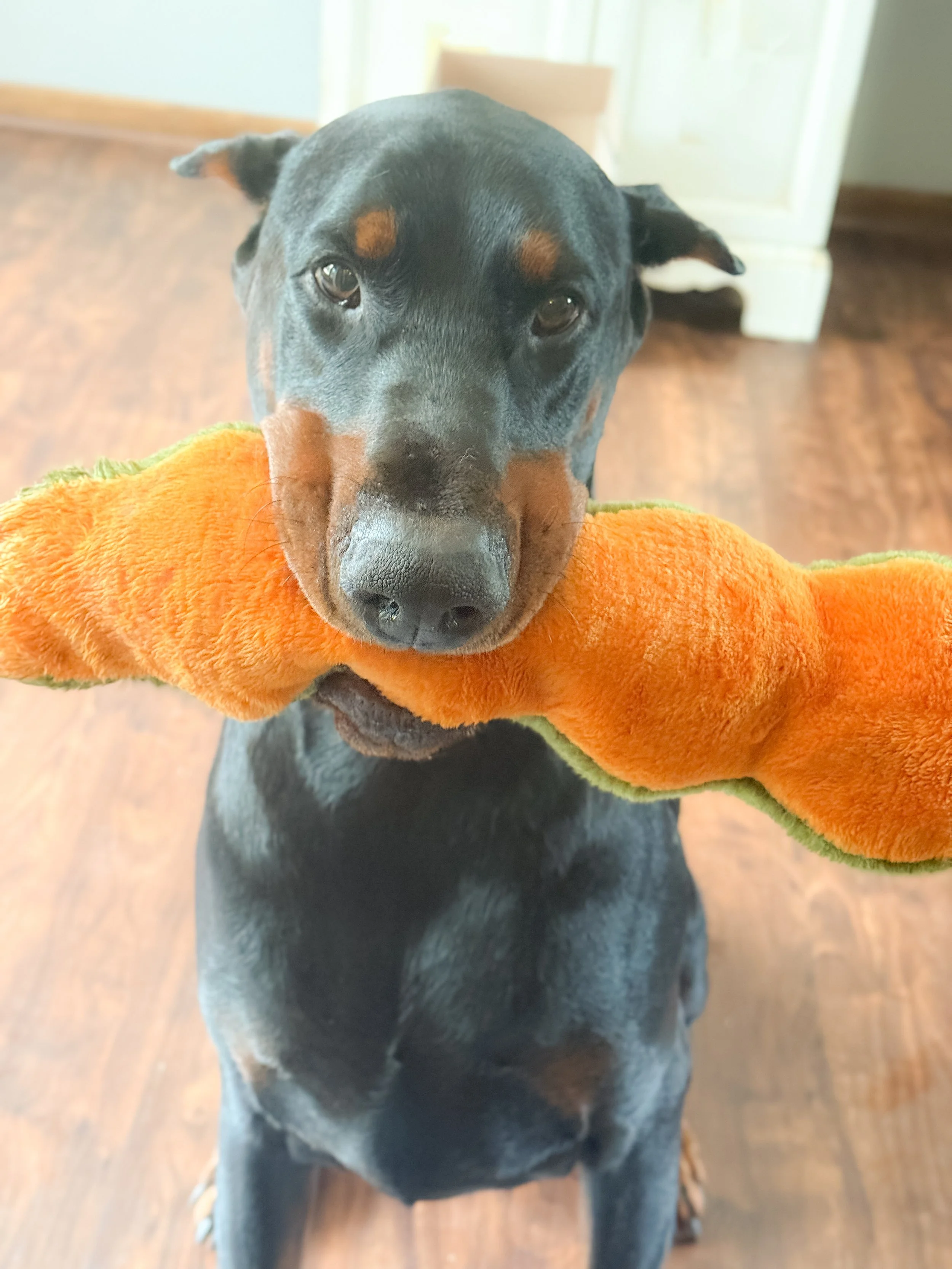Boone’s Journey With Copper Storage Disease
Last month, what was supposed to be a routine step in Boone’s care turned into a life-changing discovery. Before scheduling his neuter, our vet ran standard pre-surgery bloodwork. Everything seemed normal—until the liver values came back higher than they should have been.
To be safe, the vet recommended a liver biopsy. It was a nerve-wracking wait, but when the results came in, I learned a phrase I had never heard before: Copper Storage Disease (CSD)-
What Copper Storage Disease Means
CSD is a condition where a dog’s body doesn’t get rid of copper the way it should. Instead, copper accumulates in the liver, which can lead to inflammation, scarring, and eventually liver failure. Certain breeds, including Dobermans, are unfortunately more prone to it.
Hearing that Boone—my big, goofy, two-year-old Doberman—had this condition was overwhelming. But as I dug deeper into what it meant, I realized there were steps I could take to help him live a long and healthy life.
My Deep Dive Into CSD
I went into research mode. Late nights turned into hours of reading veterinary studies, breed forums, and nutritional guidelines. I learned that one of the biggest culprits in worsening this disease is dietary copper.
What shocked me most was discovering how much copper is added to most commercial dog foods. For the average dog, it’s fine. But for a dog like Boone, even small amounts can be dangerous over time. I knew I had to find a solution that took copper completely out of his diet.
Finding Hope in Nutrition
That’s when I discovered Dr. Pete Beck and his work with dogs who have CSD. Dr. Beck developed a food called Voyager—specifically designed with zero copper. Unlike other “low copper” foods, Voyager removes copper altogether, giving dogs with this condition the best chance at a normal, active life.
When I read about Voyager, it felt like someone had finally connected the dots. This wasn’t just about managing a disease—it was about giving Boone the ability to keep thriving without the hidden danger in his food bowl.
Boone with his favorite caterpillar.
Moving Forward With Boone
Today, Boone is back to being his energetic, playful self. He’s still the same dog who insists on taking up the entire couch and greets everyone with a head-butt of love. The difference now is that I know what’s going on inside his body—and I have the tools to protect him.
Copper Storage Disease isn’t a term most pet parents have ever heard. I know I hadn’t. But now that Boone and I are walking this path, I want to share what I’ve learned: with awareness, good veterinary care, and the right nutrition, this diagnosis doesn’t have to steal years from our dogs.
Boone’s story is still being written—but thanks to knowledge and Voyager, it’s a story filled with hope.
What Other Dog Parents Should Know
If you’re a fellow dog parent, here are a few things I wish I had known earlier:
Ask for baseline bloodwork. Even young, healthy dogs can benefit from regular liver value checks. It may uncover hidden issues before they become serious.
Watch for subtle signs. Dogs with liver trouble may show vague symptoms like decreased appetite, low energy, or changes in drinking and urination habits. These can be easy to miss.
Don’t overlook diet. Many commercial foods contain added copper, which can be harmful to dogs with CSD. If your dog is diagnosed, talk to your vet about copper-free diets like Voyager.
Advocate for your pet. If something doesn’t feel right—whether it’s lab work, a diagnosis, or a treatment plan—ask questions. You know your dog best.
Boone’s diagnosis was scary at first, but it gave me the chance to learn, prepare, and protect him. If sharing his story helps even one more dog get diagnosed early or live longer with CSD, then it’s worth it.
Because at the end of the day, our dogs depend on us to fight for them—and sometimes, that fight starts with a single blood test.
Additional Information:
CSD is also known as Wilson's disease in humans.
It is important to note that not all dogs with elevated copper levels have CSD.
If you suspect your dog may have CSD, it is essential to consult a veterinarian for proper diagnosis and treatment.

